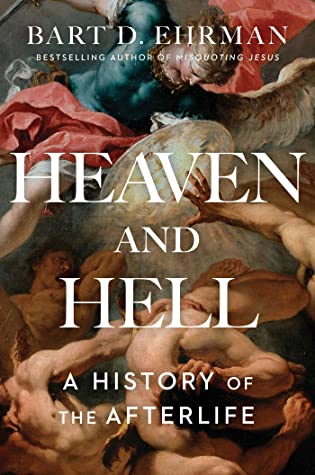Note: This review is by my husband Jim.
In his latest book, Bart Ehrman, professor of religious studies at the University of North Carolina, traces the development of Christian thought about the afterlife from early pre-Christian Persian and Greek concepts to ideas about heaven and hell prevalent today. Ehrman’s main thesis is that concepts of the afterlife most common today were not held by, and are inconsistent with, the actual teachings of Jesus.
Jesus espoused notions about the afterlife popular in his time, involving the resurrection of the body (as opposed to just the soul) after death. This idea appeared first in Jewish thought about 200 years before Christ. Our oldest known record of it is from a non-canonical book known as 1 Enoch. It later appears in the Book of Daniel, and it was pretty much adopted in that form by Jesus and his chief advocate, Paul. The resurrection was thought to be immanent: Jesus said it would take place during the lifetimes of the people who heard his words directly. The faithful would be restored to their bodies, and would live long (maybe eternal) lives in a utopian kingdom on earth. Those who rejected his word would simply die and cease existence — they would not suffer eternal punishment.
The resurrection of the body itself was once thought to be an essential Christian doctrine although many if not most Christians today would find it untenable. In a rather droll passage, Ehrman describes some of the complications that early theologians recognized would arise from such a doctrine:
“Suppose someone dies and their body is eaten by fish or other animals. Their dead body, once ingested, would provide nourishment for the animal and would, in the process of digestion and nourishment, become part of the animal’s body. Anyone who ate the animal would ingest the parts of the first person’s body, which would then become part of their own. At the resurrection, which of the two would get those parts?”
An early solution to that dilemma involved a novel theory of digestion. A Christian philosopher named Athenagoras proposed that the body can digest only food that is appropriate to it. What is not appropriate is eliminated, and so one person’s parts can never become another’s.
In any event, the early followers of Jesus faced a more momentous doctrinal problem:
“The imminent end of all things that Jesus expected with the appearance of a cosmic judge from heaven never occurred. Rather than simply conclude that Jesus had been wrong, his followers believed he had been misunderstood or misquoted. And so they took his teachings and translated them into a new idiom for a new day, making them relevant for their current situation.
* * *
By the second century very few followers of Jesus held to his views of the afterlife. Instead they subscribed to ideas of heaven and hell that later formed the basis of Christian belief that have come down to us today.”
Where did those revised concepts of the afterlife come from? Ehrman traces them to ideas promulgated by Zoroastrianism in Ancient Persia, hinted at in the Greek sagas of The Iliad and The Odyssey, and later developed by Greek philosophers.
Zoroastrianism, established by the Persian prophet Zoroaster (alternately known as Zarathustra) between c. 1500-1000 BCE, held that there would be an elaborate ritual of demarcation after death by which those who had lived in accordance with the light went to the paradise of the House of Song; those who had not were dropped into the hell of the House of Lies, where they were tormented in darkness.
Hints of punishment after death appeared in Ancient Greece in the works of Homer. Greeks believed that at the moment of death, the soul is separated from the corpse, taking on the shape of the former person. Good people and bad people would then separate, headed for either Mount Olympus in the heavens or the Underworld beneath the Earth. Homer described the Underworld as an unhappy place where Hades – the brother of Zeus and Poseidon – and his wife, Persephone, reigned over the countless “shades” of all who had died. Thanks to the military conquests of Alexander the Great, Greek ideas spread throughout the Mediterranean world. Ehrman observes, “In many respects, Christian hell is Hellenistic.”
While neither Jesus nor Paul spoke of hell, later Christians embraced it. They “came to affirm not only eternal joy for the saints but eternal torment for the sinners, creating the irony that throughout the ages most Christians have believed in a hell that did not exist for either of the founders of Christianity.”
Ehrman allows that he has no idea about what the afterlife will be, but he throws in his lot with Socrates, or rather the “ventriloquist” of Socrates, i.e., Plato:
“He believed death was the end of the story. But this was not a source of anxiety for him, and it doesn’t need to be for us either. It is instead a motivation to love this life as much as we can for as long as we can, to enjoy it to its utmost as far as possible, and to help others do the same. If all of us do that, we will live on after death — not in a personal consciousness once our brains have died, but in the lives of those we have touched.”
Evaluation: Ehrman’s interpretations of biblical writings are always carefully thought out with close textual analysis. His professional title is Distinguished Professor of Religious Studies at the University of North Carolina at Chapel Hill, but he approaches biblical texts objectively as an historian rather than as a committed theologian.
Rating: 4/5
Published by Simon & Schuster, 2020








Fascinating! I haven’t read one of Ehrman’s books in years, but it’s rather encouraging to know he’s just been plowing ahead with his research. This sounds really really good, I’m adding it to my list!
I wonder what Christian believers think of books like this, that views the historic foundation of their beliefs. Your review is very interesting.
be well… mae at maefood.blogspot.com